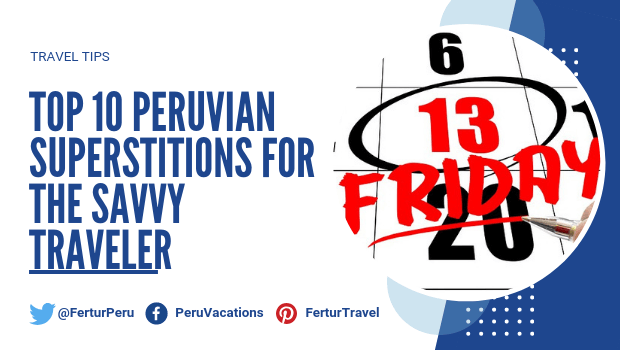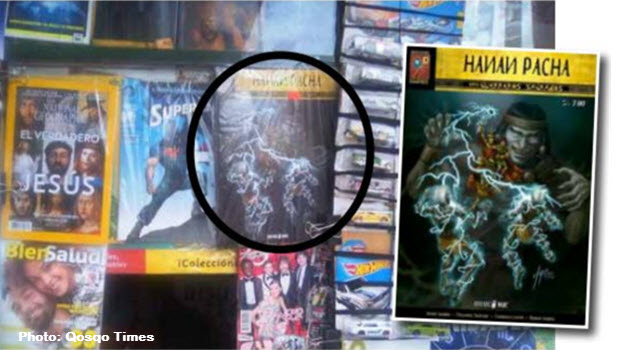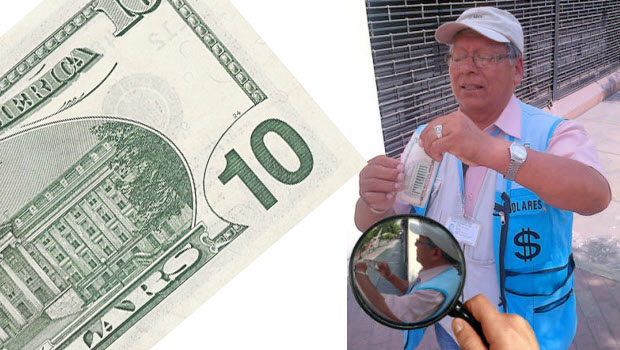
Top 10 Peruvian Superstitions for the Savvy Traveler
Superstitions, every country has them — irrational and supernatural beliefs of things to come, borne of myth, tradition and necessity. But few places offer as wondrous a collection of these foreboding, mystical and cheerful maxims as Peru.

Here, as in many other countries, Friday the 13th is considered a day of potential pitfalls at every turn.
So today, being one of those fateful Fridays, we offer this small sampling of supersticiones Peruanas:
1. Women beware: if you’re camping out on the Inca Trail — or any outdoor setting, for that matter — do not allow yourself to become “enchanted” by the mythical spirit snake “Tiracha,” which is able to impregnate unsuspecting females sleeping in the open air.
2. Women may also get pregnant if they pass near waterfalls, cascades or springs while menstruating, especially if a rainbow appears to emanate from the spring. The k’uychi onqoy (“rainbow sickness”) can also enter the women’s body if she unwisely squats down to urinate.
3. The dragonfly is an insect imbued with major mystic powers — mostly evil ones. Depending on which part of Peru we’re talking about — northern coast, central coast or selva — its visit upon a household can portend a variety of outcomes. The worst is the unexpected death of a loved one. The dragonfly is strongly associated with “brujeria” or witchcraft. It is believed that the “brujo” (or sorcerer) sends the insect to perch on the person whom a client has paid to see psychically damaged. The insect steals a bit of the victim’s soul and returns with it to the sorcerer.
4. Beetles are a different story. Finding a turned-over beetle and flipping it back over to save its life is believed to bring good luck. A lady bug landing on your shirt cuff is reason to rejoice.
5. Stepping in dog or horse crap is also considered good luck, but only when it’s purely by accident — lest children spend their time searching for piles of excrement to stomp on.
6. You’re looking for trouble if you accept ajà chili sauce at a dining table that’s been passed hand-to-hand. Doing so will create bad blood between the passer and receiver of the condiment. In provincial regions like Ancash, Huánuco and San Martin, it’s considered common courtesy if someone asks you to pass the ajà to place it on the table within reach in front of them.
7. The Evil Eye: this magic malady most often afflicts children and is brought on by an envious or simply overly intense stare from a stranger.
Symptoms include crying jags, fever and incessant yawning. Affective treatment requires a fresh, room temperature chicken egg, a tall glass of clean water and a grandmother or great aunt who knows how to apply the traditional procedure. She will soothingly pass the egg over the child’s body and head, extracting the suspected evil energy.
The egg is then cracked into the glass to float in the water for about five minutes. If the egg yolk and white maintains its form, you should be able to discern in the embryonic mass a tiny eye, confirming that the child was infected by Evil Eye, which has been successfully removed and treated. If the egg yolk breaks up and melds into white, that’s an indication that there was no Evil Eye to begin with.
8. The passing of the egg can also be an effective treatment for an adult who has suffered “susto” or fright. That’s a condition brought on by an experience so terrifying that your soul temporarily leaves your body.
9. To prevent one’s hair from being used in malicious magic by sorcerers, loose hairs are carefully collected from hair brushes, and meticulously swept up after a child’s first hair cut, and burned.
10. El Daño, or The Damage, is a streak of bad luck inflicted by sorcerer’s spell, motivated by revenge or envy. It can be removed by ritually passing a guinea pig over your entire body to draw out and absorb the malicious spell.
 10 Essential Travel Apps For Your Peru Vacation
10 Essential Travel Apps For Your Peru Vacation  Sacred Warriors Comics on Sale at Cusco News Stands Now
Sacred Warriors Comics on Sale at Cusco News Stands Now  10 Steps to Cyber Safety During Your Peru Vacation
10 Steps to Cyber Safety During Your Peru Vacation  Best airline for stunning ice peak mountain views during flight to Cusco
Best airline for stunning ice peak mountain views during flight to Cusco  What should I carry in my backpack to go to Machu Picchu?
What should I carry in my backpack to go to Machu Picchu?  You can use US Dollars in Peru, but…
You can use US Dollars in Peru, but…  What is the best time to visit Peru?
What is the best time to visit Peru?  Peru Will Enforce 6-Month Passport Rule
Peru Will Enforce 6-Month Passport Rule
Peru has some weird superstitions.